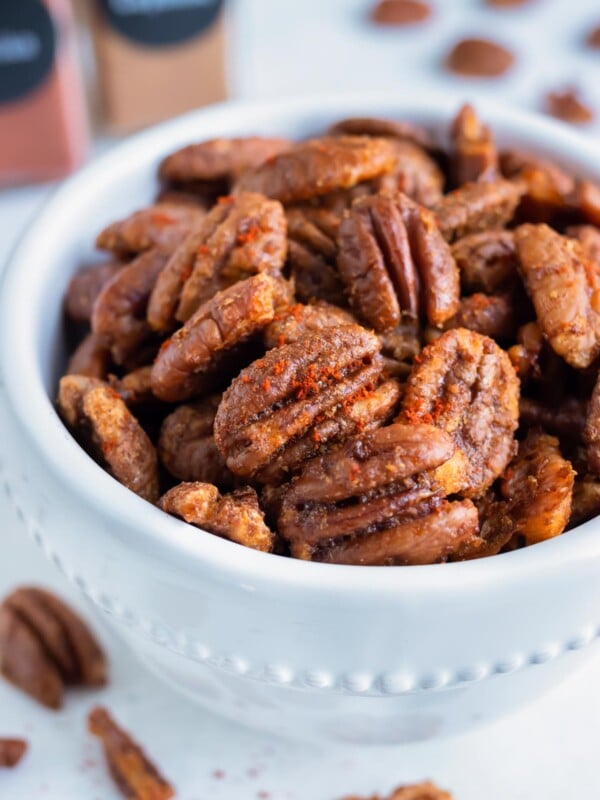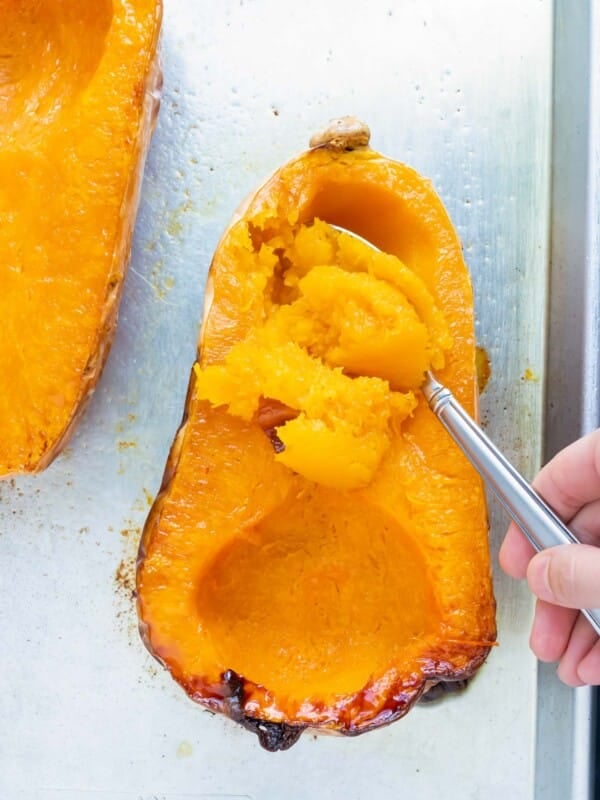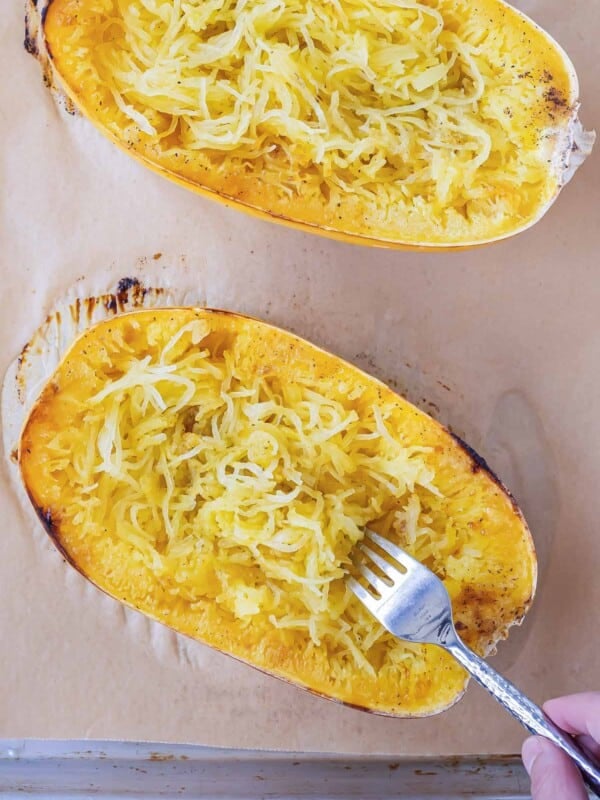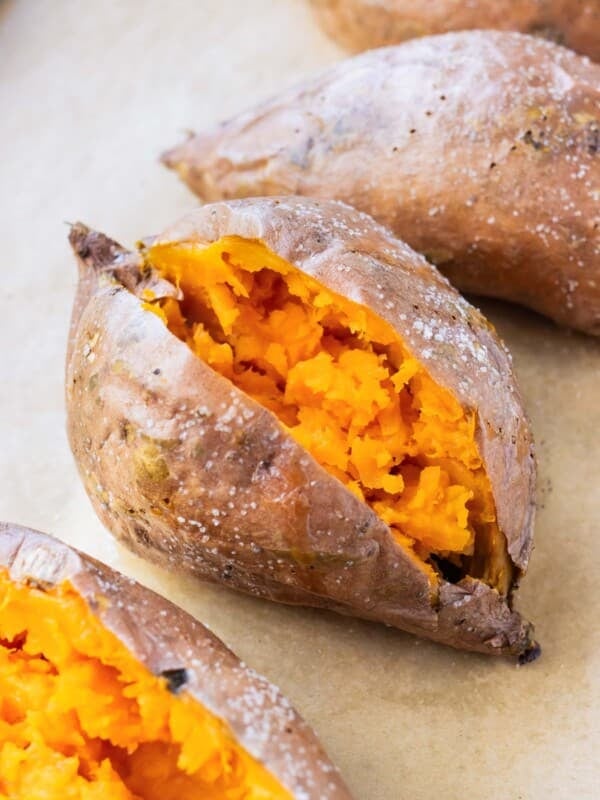Whether for salad dressings or a marinara, you probably have a few different types of vinegars in your pantry. With such a range, it’s important to know how they’re similar and how they differ. Learning about the best vinegars to keep on hand will make it that much easier to choose the right one to brighten up your next dish!
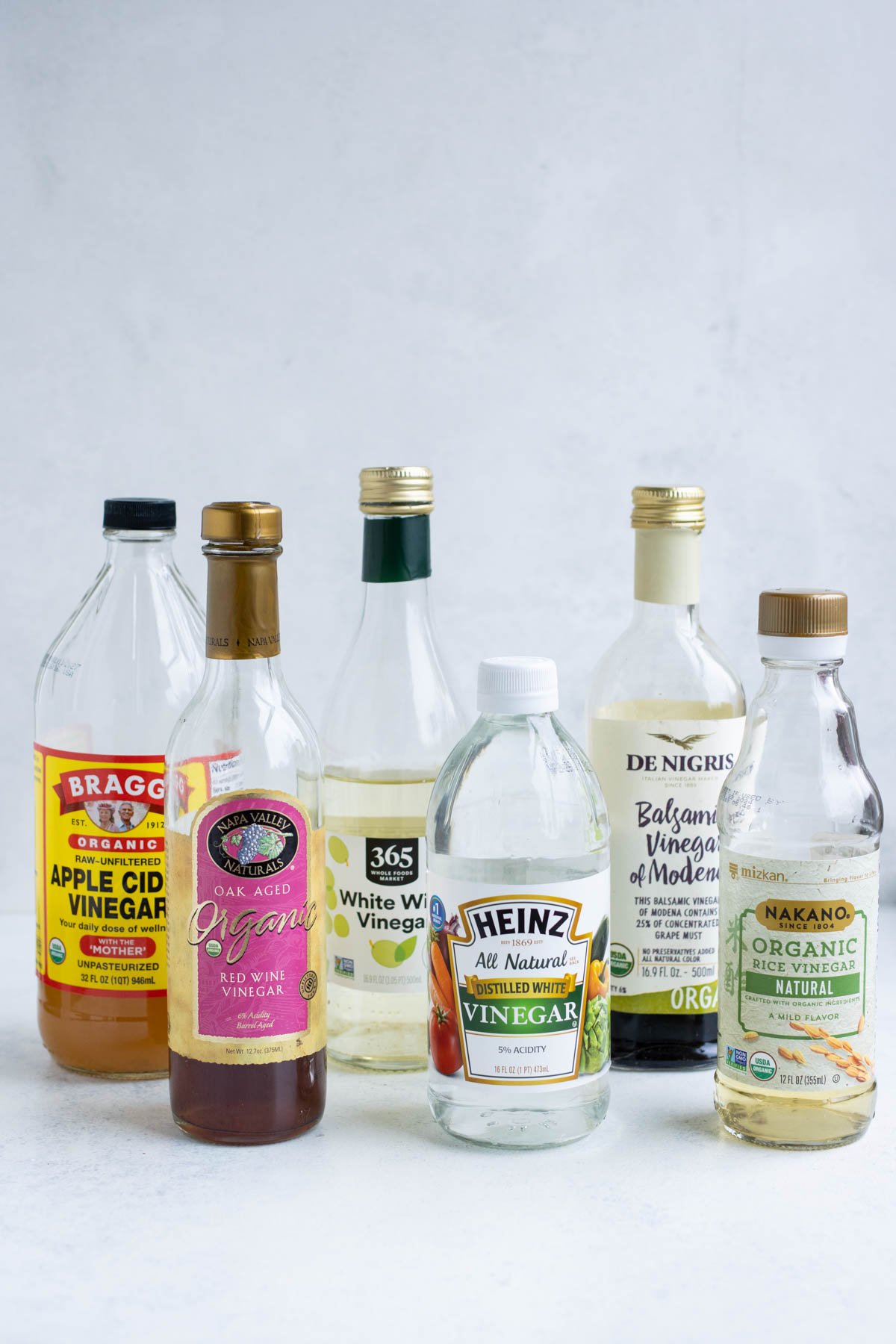
The truth is, vinegars play an important role in your food. It can be very overwhelming to understand how their different flavors can change or elevate your dish.
This post breaks down each type of vinegar by its flavor profile and how it can be best used in your everyday dishes.
What is Vinegar?
Vinegar is basically fermented juice that has a sour taste because of its naturally-occurring bacterial growth.
The “fermented juice” consists of water and natural sugars. The water and sugars ferment when yeast is added to the mix. Because the yeast consumes sugar, the liquid turns into alcohol. Then, after much time, the alcohol ferments into acetic acid.
The flavor profile of each kind of vinegar is determined by which grain or fruit is being used. That is why there is a vast range of vinegars. They are used for different dishes to achieve certain flavors.
Types of Vinegars
Distilled White Vinegar
This is the most common type of vinegar, and it’s probably sitting underneath your kitchen sink cupboard with the cleaning supplies. It has a sharp flavor and is very potent. Why? Because white vinegar comes from a grain-based alcohol resulting in a crisp, clear vinegar. It’s mainly used for cleaning more than cooking because it’s so strong.
With distilled white vinegar, less is more. It’s commonly added as a preserving agent to pickle your favorite vegetables like garlic, radishes, beets, carrots, jalapenos, and red onions. It can also be used as a cleaning agent for your countertops, cookware, toilets, and even your coffee maker.
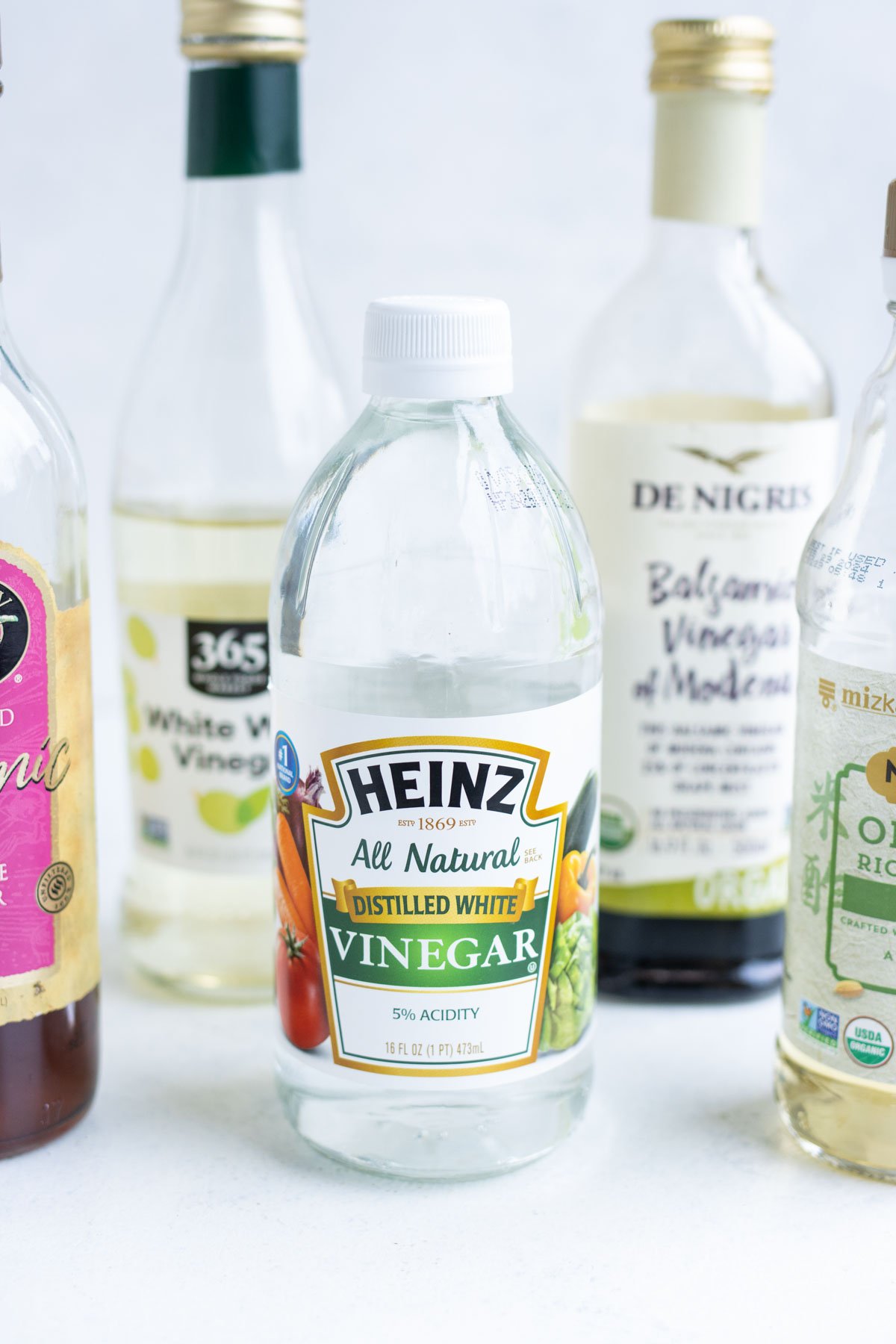
Apple Cider Vinegar
In terms of its popularity, apple cider vinegar is a close second to distilled white vinegar. It’s apple-based, which gives it a fruity flavor, and it has a sour taste because of its acetic acid. It can be added to marinades, salad dressings, and even coleslaw.
To learn more about the health benefits of apple cider vinegar or how you can use apple cider vinegar substitutes, check out these posts for the whole run-down.
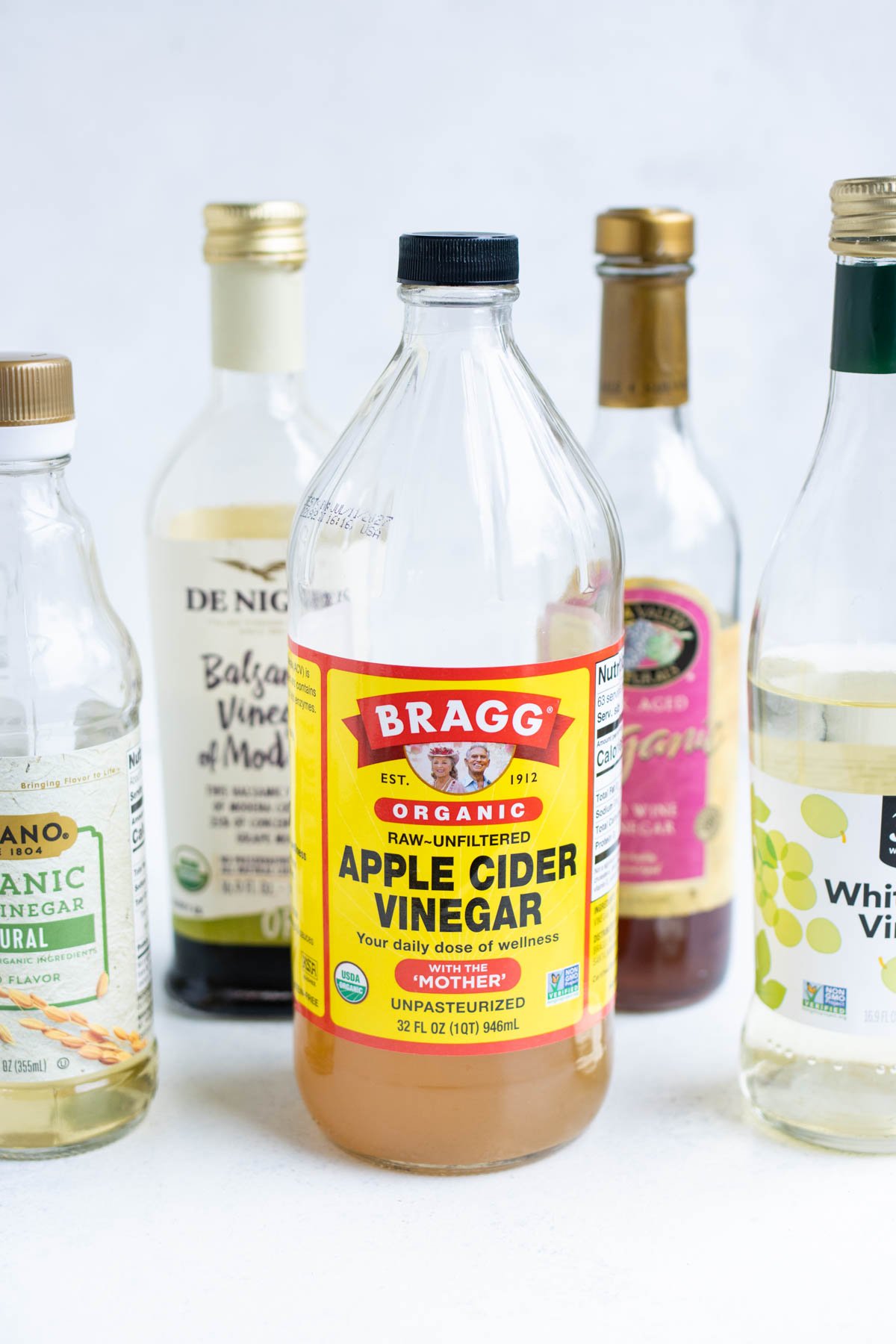
White Wine Vinegar
This type of vinegar is used in cooking more than distilled white vinegar because it has a very mild taste in comparison. Because it’s white wine-based, it’s less less acidic than its apple cider cousin. It has a sweet flavor that is light and balances out the overall taste, especially in salad dressings like Olive Garden’s Italian Dressing and soups.
Traditional Balsamic Vinegar
Balsamic vinegar is actually made by pressing aged grapes in oak barrels. It’s best used in Italian dishes. This vinegar varies in flavor depending on how long it’s been fermenting. The older it is, the pricier it gets.
This vinegar is definitely sweet and almost zesty in flavor. It’s a great choice when mixed with olive oil to make the most classic balsamic vinaigrette dressing. It can be easily drizzled over mozzarella cheese, tomatoes, and basil OR dipped with your favorite French bread.
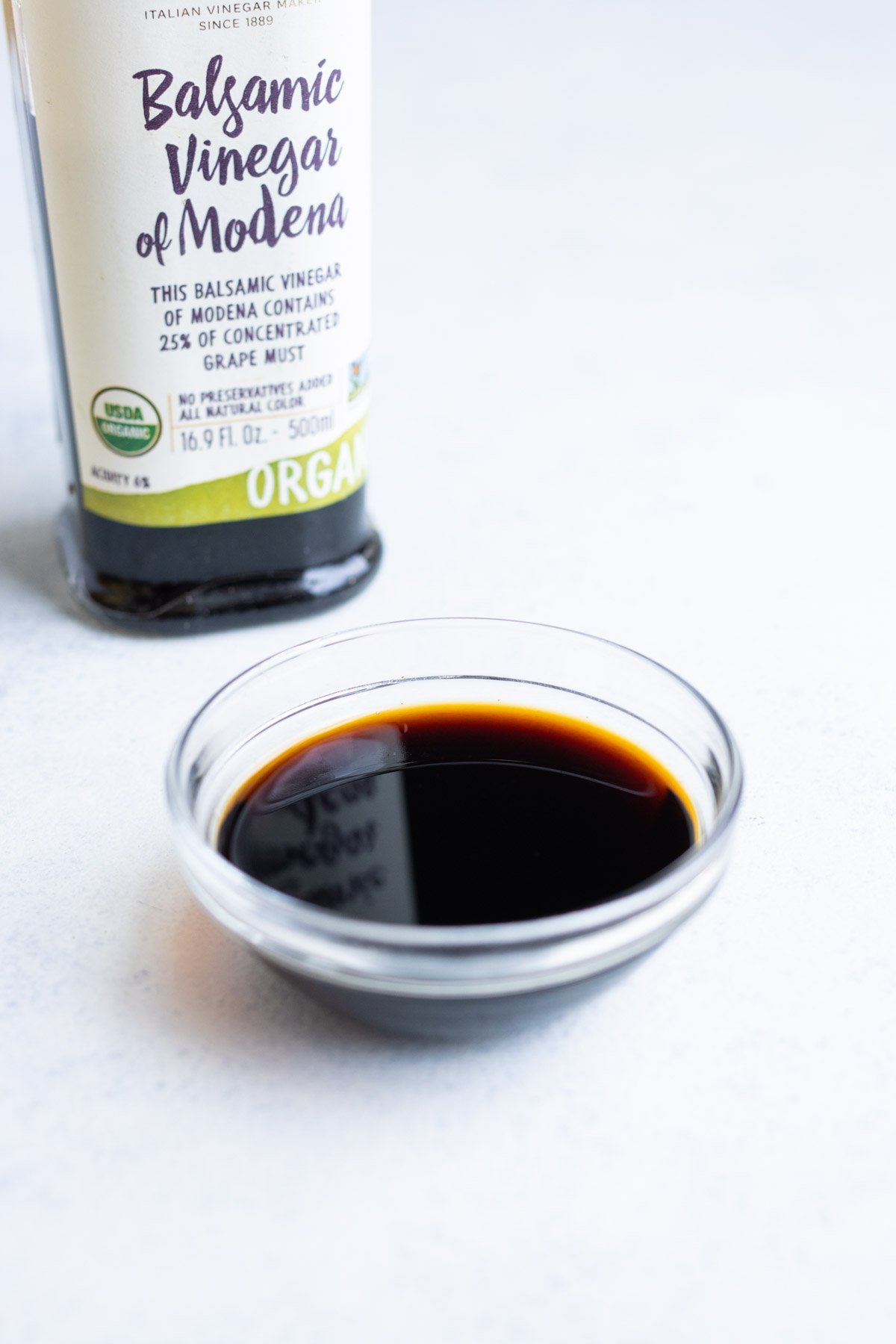
Red Wine Vinegar
Red wine vinegar offers a sweet, less acidic taste. This type is red wine-based, so it brings in a tangy flavor that’s perfect for vinaigrettes and reductions. This vinegar is a Mediterranean must-have to top off oysters and clams, sauces, and pickling vegetables.
Rice Wine Vinegar
Rice wine vinegar is most commonly used for Asian cuisine. It’s fermented rice-based, which makes it sweeter than red wine and white wine vinegars. It’s the key ingredient for sushi vinegar, providing the perfect flavor for sushi rice. You can pack an even bigger punch by pairing it with soy sauce in a marinade.
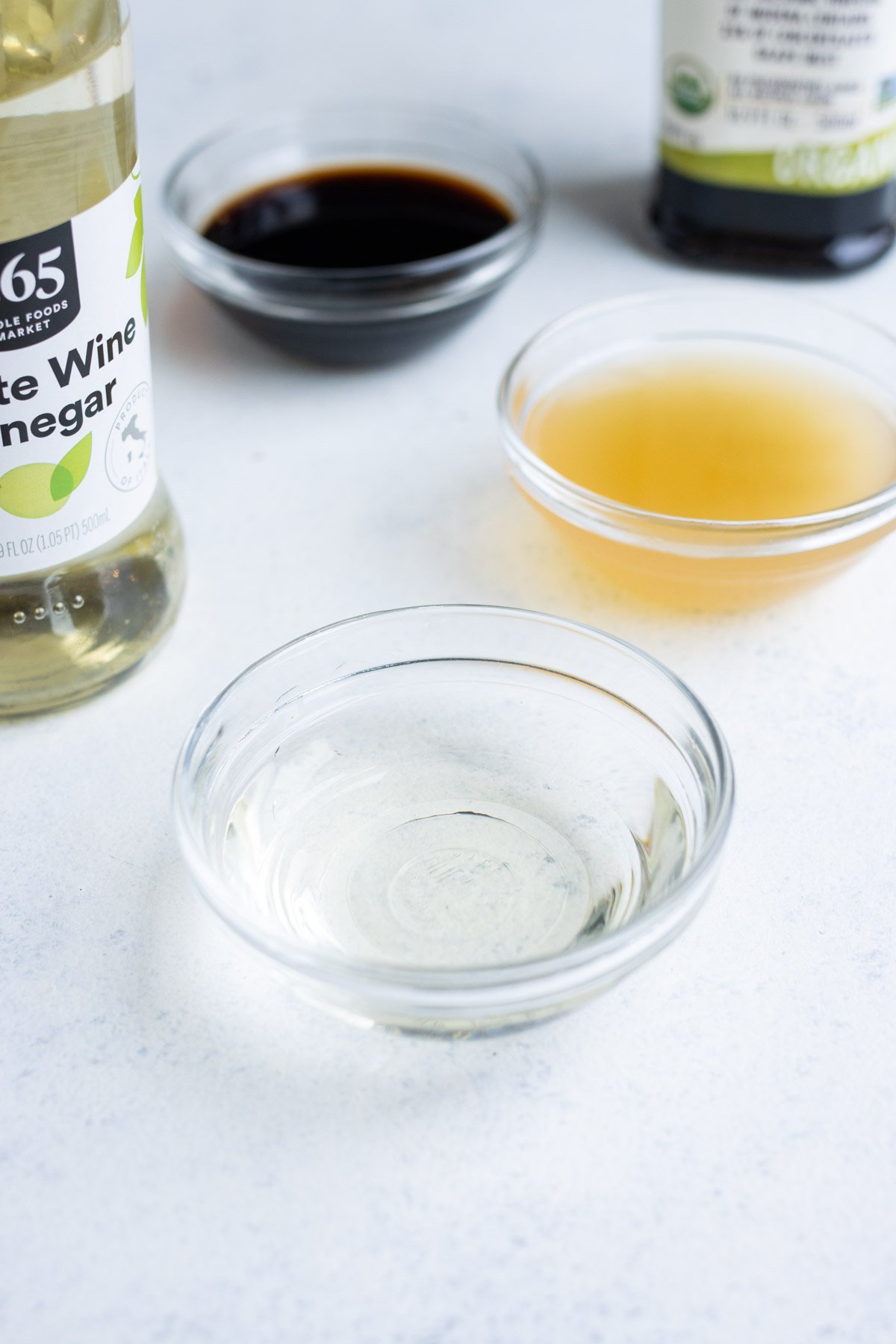
Black Vinegar
This Chinese vinegar is also known as Chinkiang vinegar. It’s a grain-based vinegar that is often used in dumplings, duck, and Asian dipping sauces. It has an earthy, smoky flavor because of the rice, wheat, and millet grains it contains. It enhances stir fries and meat-centered Chinese cuisine like this Crispy Gluten-Free Chinese Orange Chicken.
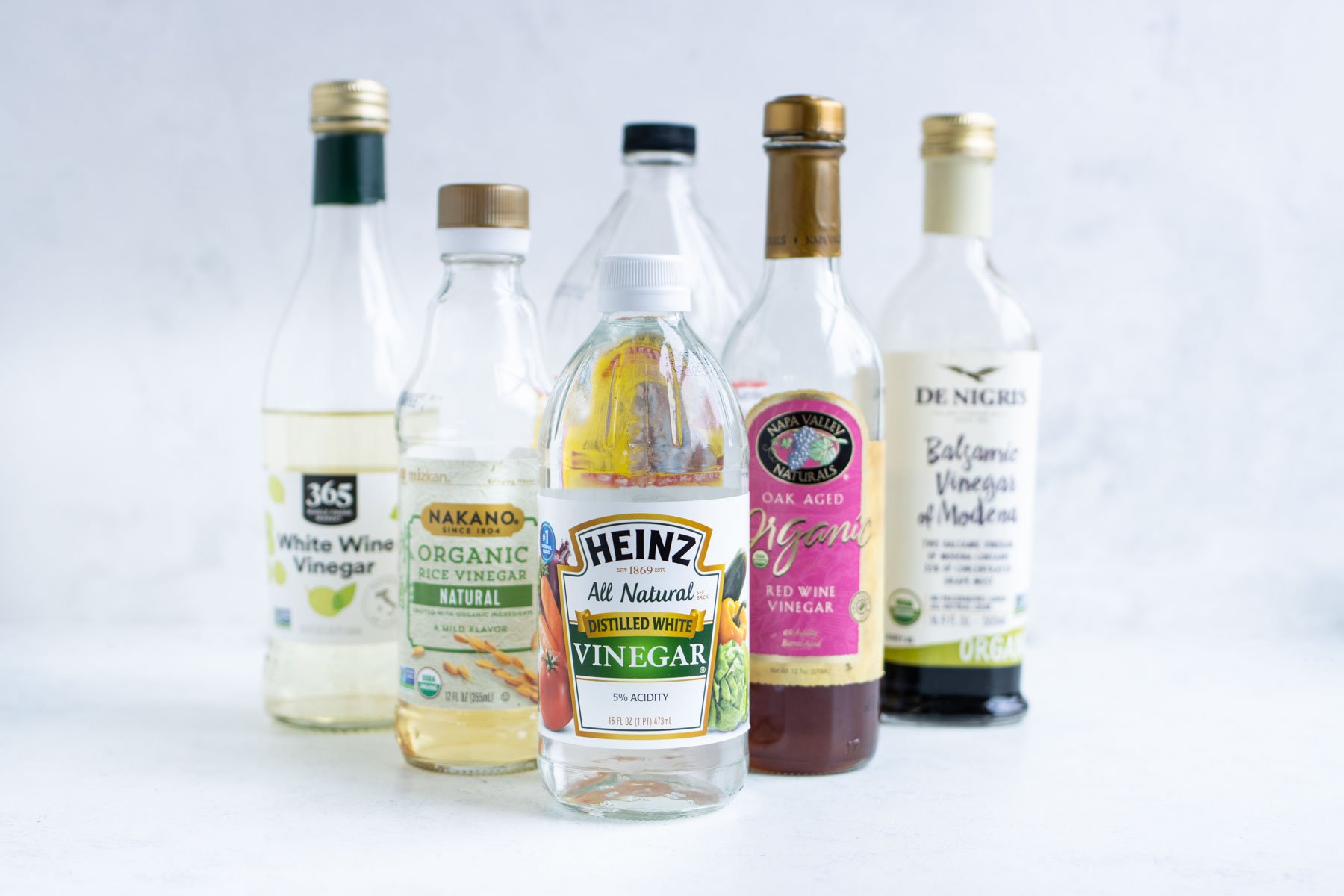
Champagne Vinegar
Champagne vinegar is actually a different type of white wine vinegar. It is not, in fact, made from actual champagne but from chardonnay grapes. This has a sweet and airy flavor that will not overpower. It can be considered a delicacy in sauces and marinades. If you don’t have this in your pantry, rice wine vinegar is an excellent and close substitute for your pickles, salad dressings, and sauces.
Sherry Vinegar
Sherry vinegar is closely related to balsamic vinegar. It is wine-based, and full of a nutty, acidic flavor. It’s so rich that it’s not as sweet, so use it sparingly. This vinegar makes for a perfect glaze, reduction, or salad dressing.
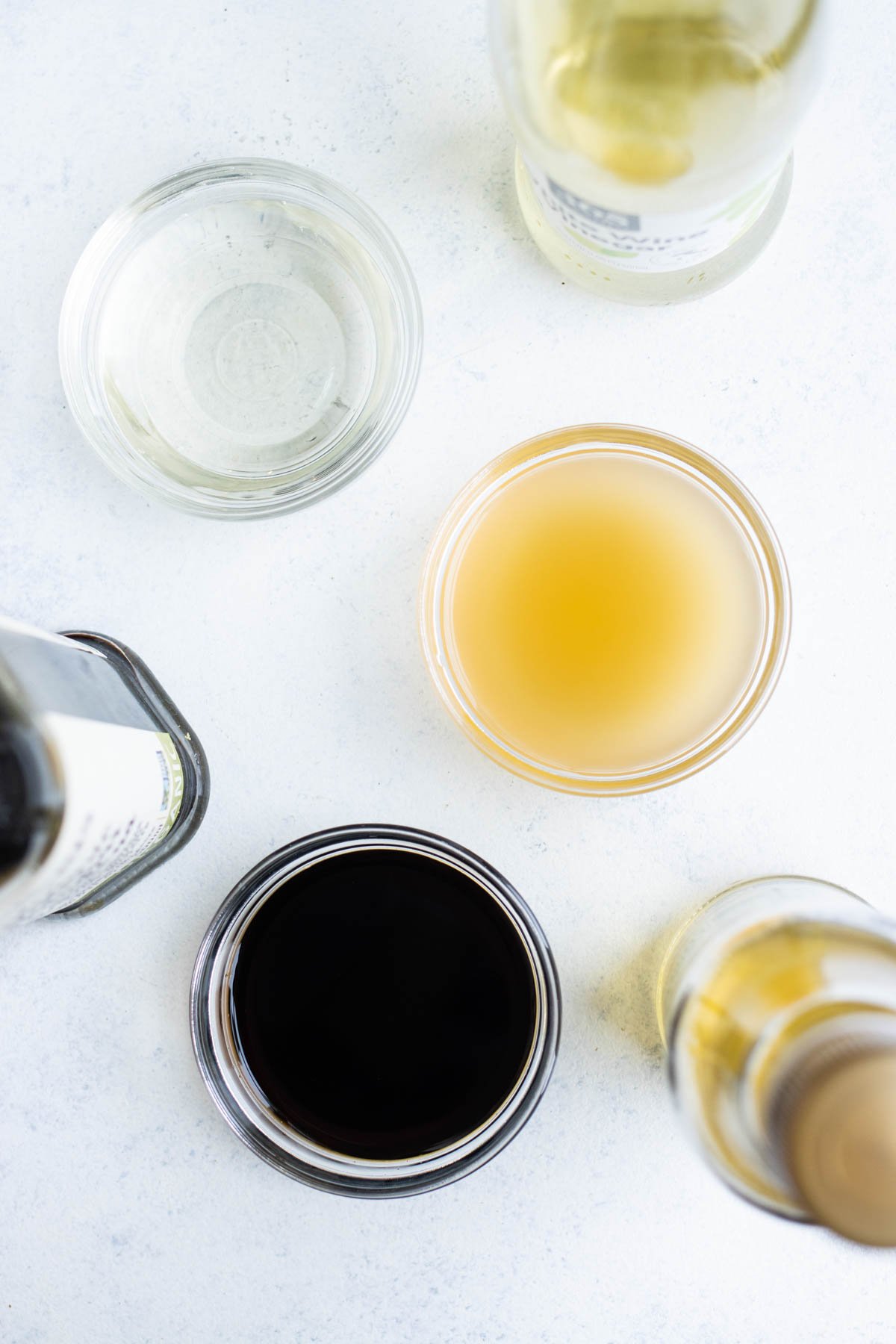
Malt Vinegar
Malt vinegar isn’t as common to have in your pantry. It’s barley-based, so it’s a great pairing with fish and chips and homemade Tartar Sauce. This one has a nutty, toasty, and almost citrusy flavor. This would be a great dipping sauce for your French fries. It can also add incredible flavor to your dressings.
Beer Vinegar
Beer vinegar has a similar taste to malt vinegar, actually. It’s beer-based, and is a great alternative for your fish and chips dipping sauce. There are many types of beer vinegars because of the different types of beer out there. This has a nutty, yet complex flavor that is a fun enhancer to any game day side dish.
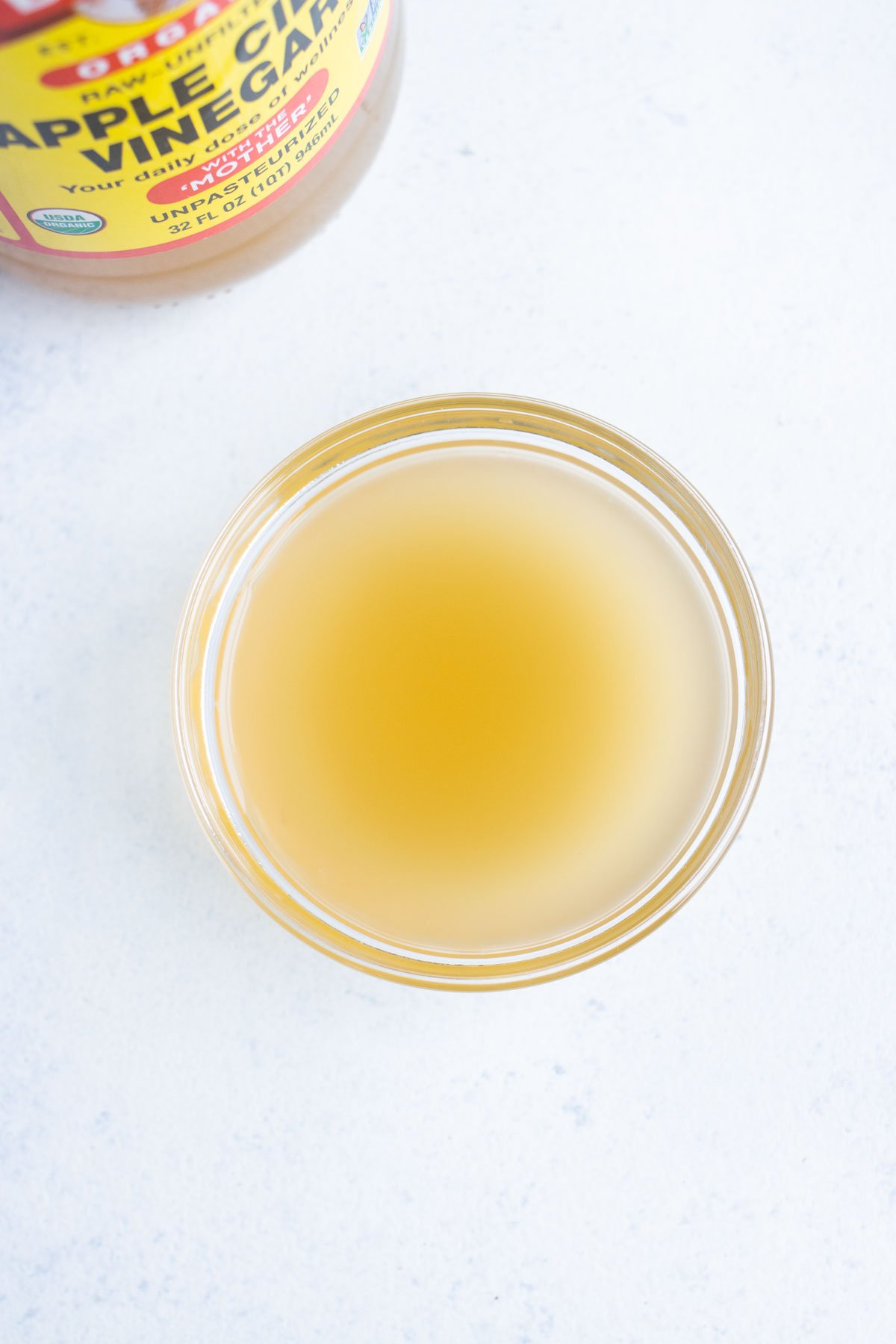
What is the purpose of vinegar?
Let’s look into the different purposes of this condiment because it is not only used for cooking!
Meat Tenderizer
Vinegars can help soften and tenderize meat because the acid breaks down those tough, connective tissues. Marinating meat for up to 24 hours before cooking can really make a difference in the taste and texture of your meats.
Pickler & Preservative
Vinegars can add a bright, sour taste to your foods while also making them last longer. The acid in the vinegars helps stall the natural decaying process of many foods like vegetables.
Cleaner
Vinegars like distilled white wine vinegar are excellent (and cost-effective!) for cleaning because the high acidity cuts through caked-on dirt, grease, and grub. Vinegars also contain all-natural ingredients which eliminate the scare of harsh chemicals.
Check out how to clean an air fryer to know how to best use this vinegar as a cleaner.
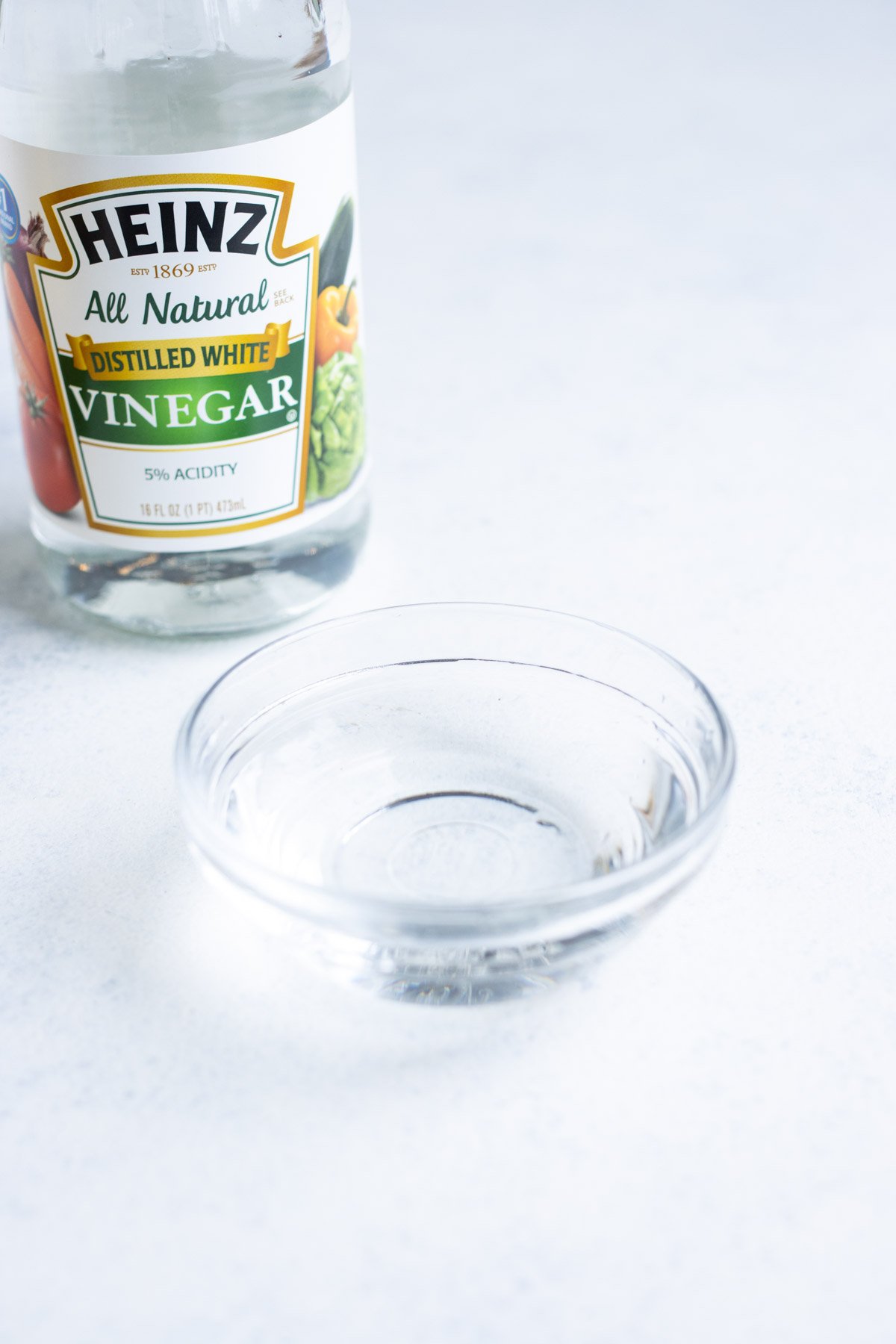
How long can vinegar last?
Vinegar can last on your pantry shelf indefinitely if stored in a cool, dry place away from heat and light. The acidic nature of vinegar is what makes this possible! The appearance of your vinegar can change over time, but that does not mean it’s wasted. When you see the development of sediment towards the bottom of the bottle or a shift in color, that simply means that your vinegar is further fermenting.
When in doubt, citrus it out.
If you’ve just run out of your favorite vinegar and can’t make it to your nearest grocery store, use citrus! Oranges, limes, lemons, or grapefruits have high acidity, so they will be a perfect substitute. They are fresh, full of flavor, and will help your dish in the most dire situations. Learn more about these citrus fruits in this post about vinegar substitutes.
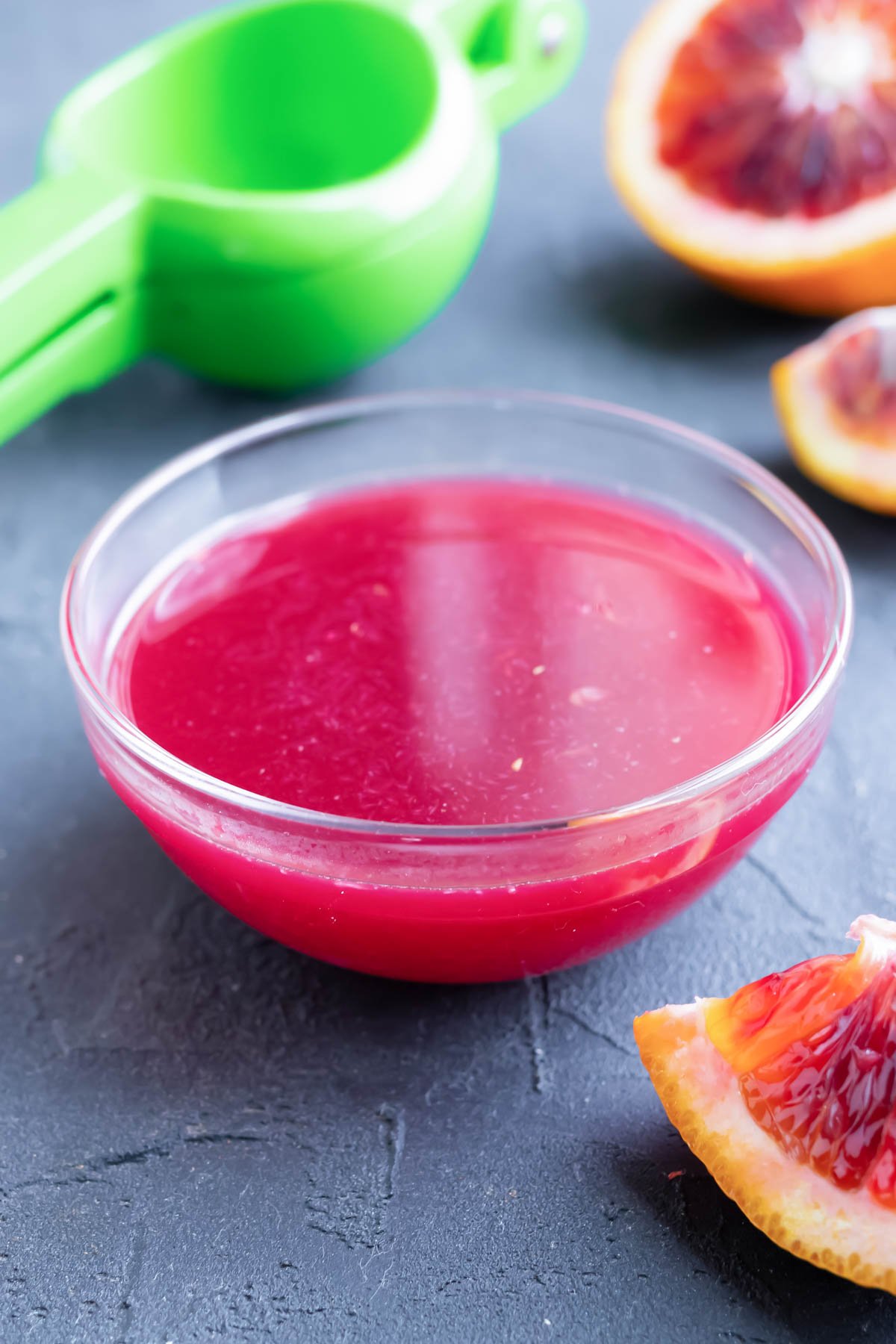
The Best Recipes that Include Vinegars
You do not want to miss out on these Healthy Salad Dressings, perfect for topping off any salad. Try out this Teriyaki Sauce and pair it with chicken or fish. Make this Southern Homemade Coleslaw for your next backyard barbecue. To elevate any green salad, these Pickled Red Onions, Pickled Carrots, and Pickled Garlic are all winners. Make this Cucumber Tomato Salad when you want a fresh, burst of flavor! And don’t forget to make this Balsamic Reduction that you can whip out at ANY time for ANY dish.


